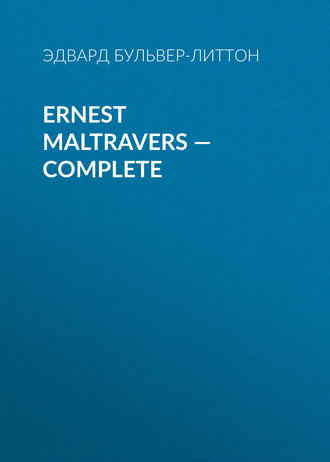
Эдвард Бульвер-Литтон
Ernest Maltravers — Complete
CHAPTER VIII
“Aestuat ingens
Imo in corde pudor, mixtoque insania luctu,
Et furiis agitatus amor, et conscia virtus.”26
—VIRGIL.
THE next day, punctual to his appointment, Cesarini repaired to his critical interview with Lady Florence. Her countenance, which, like that of most persons whose temper is not under their command, ever too faithfully expressed what was within, was unusually flushed. Lumley had dropped words and hints which had driven sleep from her pillow and repose from her mind.
She rose from her seat with nervous agitation as Cesarini entered and made his grave salutation. After a short and embarrassed pause, she recovered, however, her self-possession, and with all a woman’s delicate and dexterous tact, urged upon the Italian the expediency of accepting the offer of honourable independence now extended to him.
“You have abilities,” she said, in conclusion, “you have friends, you have youth; take advantage of those gifts of nature and fortune, and fulfil such a career as,” added Lady Florence, with a smile, “Dante did not consider incompatible with poetry.”
“I cannot object to any career,” said Cesarini, with an effort, “that may serve to remove me from a country that has no longer any charms for me. I thank you for your kindness; I will obey you. May you be happy; and yet—no, ah! no—happy you must be! Even he, sooner or later, must see you with my eyes.”
“I know,” replied Florence, falteringly, “that you have wisely and generously mastered a past illusion. Mr. Ferrers allowed me to see the letter you wrote to Er—-to Mr. Maltravers; it was worthy of you: it touched me deeply; but I trust you will outlive your prejudices against—”
“Stay,” interrupted Cesarini; “did Ferrers communicate to you the answer to that letter?”
“No, indeed.”
“I am glad of it.”
“Why?”
“Oh, no matter. Heaven bless you; farewell.”
“No; I implore you, do not go yet; what was there in that letter that it could pain me to see? Lumley hinted darkly; but would not speak out: be more frank.”
“I cannot: it would be treachery to Maltravers, cruelty to you; yet would it be cruel?”
“No, it would not; it would be kindness and mercy; show me the letter—you have it with you.”
“You could not bear it; you would hate me for the pain it would give you. Let me depart.”
“Man, you wrong Maltravers. I see it now. You would darkly slander him whom you cannot openly defame. Go; I was wrong to listen to you—go!”
“Lady Florence, beware how you taunt me into undeceiving you. Here is the letter, it is his handwriting; will you read it? I warn you not.”
“I will believe nothing but the evidence of my own eyes; give it me.”
“Stay then; on two conditions. First, that you promise me sacredly that you will not disclose to Maltravers, without my consent, that you have seen this letter. Think not I fear his anger. No! but in the mortal encounter that must ensue, if you thus betray me, your character would be lowered in the world’s eyes, and even I (my excuse unknown) might not appear to have acted with honour in obeying your desire, and warning you, while there is yet time, of bartering love for avarice. Promise me.”
“I do, I do most solemnly.”
“Secondly, assure me that you will not ask to keep the letter, but will immediately restore it to me.”
“I promise it. Now then.”
“Take the letter.”
Florence seized and rapidly read the fatal and garbled document: her brain was dizzy, her eyes clouded, her ears rang as with the sound of water, she was sick and giddy with emotion; but she read enough. This letter was written, then, in answer to Castruccio’s of last night; it avowed dislike of her character; it denied the sincerity of her love; it more than hinted the mercenary nature of his own feelings. Yes, even there, where she had garnered up her heart, she was not Florence, the lovely and beloved woman; but Florence, the wealthy and high-born heiress. The world which she had built upon the faith and heart of Maltravers crumbled away at her feet. The letter dropped from her hands; her whole form seemed to shrink and shrivel up; her teeth were set, and her cheek was as white as marble.
“O God!” cried Cesarini, stung with remorse. “Speak to me, speak to me, Florence! I did wrong; forget that hateful letter! I have been false—false!”
“Ah, false—say so again—no, no, I remember he told me—he, so wise, so deep a judge of human character, that he would be sponsor for your faith—, that your honour and heart were incorruptible. It is true; I thank you—you have saved me from a terrible fate.”
“O, Lady Florence, dear—too dear—yet, would that—alas! she does not listen to me,” muttered Castruccio, as Florence, pressing her hands to her temples, walked wildly to and fro the room. At length she paused opposite to Cesarini, looked him full in the face, returned him the letter without a word, and pointed to the door.
“No, no, do not bid me leave you yet,” said Cesarini, trembling with repentant emotion, yet half beside himself with jealous rage at her love for his rival.
“My friend, go,” said Florence, in a tone of voice singularly subdued and soft. “Do not fear me; I have more pride in me than even affection; but there are certain struggles in a woman’s breast which she could never betray to any one—any one but a mother. God help me, I have none! Go; when next we meet, I shall be calm.”
She held out her hand as she spoke, the Italian dropped on his knee, kissed it convulsively, and, fearful of trusting himself further, vanished from the room.
He had not been long gone before Maltravers was seen riding through the street. As he threw himself from his horse, he looked up at the window, and kissed his hand at Lady Florence, who stood there watching his arrival, with feelings indeed far different from those he anticipated. He entered the room lightly and gaily.
Florence stirred not to welcome him. He approached and took her hand; she withdrew it with a shudder.
“Are you not well, Florence?”
“I am well, for I have recovered.”
“What do you mean? why do you turn from me?”
Lady Florence fixed her eyes on him, eyes that literally blazed; her lip quivered with scorn.
“Mr. Maltravers, at length I know you. I understand the feelings with which you have sought a union between us. O God! why, why was I thus cursed with riches—why made a thing of barter and merchandise, and avarice, and low ambition? Take my wealth, take it, Mr. Maltravers, since that is what you prize. Heaven knows I can cast it willingly away; but leave the wretch whom you long deceived, and who now, wretch though she be, renounces and despises you!”
“Lady Florence, do I hear aright? Who has accused me to you?”
“None, sir, none; I would have believed none. Let it suffice that I am convinced that our union can be happy to neither: question me no further; all intercourse between us is for ever over!”
“Pause,” said Maltravers, with cold and grave solemnity; “another word, and the gulf will become impassable. Pause.”
“Do not,” exclaimed the unhappy lady, stung by what she considered the assurance of a hardened hypocrisy—“do not affect this haughty superiority; it dupes me no longer. I was your slave while I loved you: the tie is broken. I am free, and I hate and scorn you! Mercenary and sordid as you are, your baseness of spirit revives the differences of our rank. Henceforth, Mr. Maltravers, I am Lady Florence Lascelles, and by that title alone will you know me. Begone, Sir!”
As she spoke, with passion distorting every feature of her face, all her beauty vanished away from the eyes of the proud Maltravers, as if by witchcraft: the angel seemed transformed into the fury; and cold, bitter, and withering was the eye which he fixed upon that altered countenance.
“Mark me, Lady Florence Lascelles,” said he, very calmly, “you have now said what you can never recall. Neither in man nor in woman did Ernest Maltravers ever forget or forgive a sentence which accused him of dishonour. I bid you farewell for ever; and with my last words I condemn you to the darkest of all dooms—the remorse that comes too late!” Slowly he moved away; and as the door closed upon that towering and haughty form, Florence already felt that his curse was working to its fulfilment. She rushed to the window—she caught one last glimpse of him as his horse bore him rapidly away. Ah! when shall they meet again?
CHAPTER IX
“And now I live—O wherefore do I live?
And with that pang I prayed to be no more.”
WORDSWORTH.
IT was about nine o’clock that evening, and Maltravers was alone in his room. His carriage was at the door—his servants were arranging the luggage—he was going that night to Burleigh. London—society-the world—were grown hateful to him. His galled and indignant spirit demanded solitude. At this time, Lumley Ferrers entered.
“You will pardon my intrusion,” said the latter, with his usual frankness—“but—”
“But what, sir? I am engaged.”
“I shall be very brief. Maltravers, you are my old friend. I retain regard and affection for you, though our different habits have of late estranged us. I come to you from my cousin—from Florence—there has been some misunderstanding between you. I called on her to-day after you left the house. Her grief affected me. I have only just quitted her. She has been told by some gossip or other some story or other—women are credulous, foolish creatures;—undeceive her, and, I dare say, all may be settled.”
“Ferrers, if a man had spoken to me as Lady Florence did, his blood or mine must have flowed. And do you think that words that might have plunged me into the guilt of homicide if uttered by a man, I could ever pardon in one whom I had dreamed of for a wife? Never!”
“Pooh, pooh—women’s words are wind. Don’t throw away so splendid a match for such a trifle.”
“Do you too, sir, mean to impute mercenary motives to me?”
“Heaven forbid! You know I am no coward, but I really don’t want to fight you. Come, be reasonable.”
“I dare say you mean well, but the breach is final—all recurrence to it is painful and superfluous. I must wish you good evening.”
“You have positively decided?”
“I have.”
“Even if Lady Florence made the amende honorable?”
“Nothing on the part of Lady Florence could alter my resolution. The woman whom an honourable man—an English gentleman—makes the partner of his life, ought never to listen to a syllable against his fair name: his honour is hers, and if her lips, that should breathe comfort in calumny, only serve to retail the lie—she may be beautiful, gifted, wealthy, and high-born, but he takes a curse to his arms. That curse I have escaped.”
“And this I am to say to my cousin?”
“As you will. And now stay, Lumley Ferrers, and hear me. I neither accuse nor suspect you, I desire not to pierce your heart, and in this case I cannot fathom your motives; but if it should so have happened that you have, in any way, ministered to Lady Florence Lascelles’ injurious opinions of my faith and honour, you will have much to answer for, and sooner or later there will come a day of reckoning between you and me.”
“Mr. Maltravers, there can be no quarrel between us, with my cousin’s fair name at stake, or else we should not now part without preparations for a more hostile meeting. I can bear your language. I, too, though no philosopher, can forgive. Come, man, you are heated—it is very natural;—let us part friends—your hand.”
“If you can take my hand, Lumley, you are innocent, and I have wronged you.”
Lumley smiled, and cordially pressed the hand of his old friend.
As he descended the stairs, Maltravers followed, and just as Lumley turned into Curzon Street, the carriage whirled rapidly past him, and by the lamps he saw the pale and stern face of Maltravers.
It was a slow, drizzling rain,—one of those unwholesome nights frequent in London towards the end of autumn. Ferrers, however, insensible to the weather, walked slowly and thoughtfully towards his cousin’s house. He was playing for a mighty stake, and hitherto the cast was in his favour, yet he was uneasy and perturbed. His conscience was tolerably proof to all compunction, as much from the levity as from the strength of his nature; and (Maltravers removed) he trusted in his knowledge of the human heart, and the smooth speciousness of his manner, to win, at last, in the hand of Lady Florence, the object of his ambition. It was not on her affection, it was on her pique, her resentment, that he relied. “When a woman fancies herself slighted by the man she loves, the first person who proposes must be a clumsy wooer indeed, if he does not carry her away.” So reasoned Ferrers, but yet he was ruffled and disquieted; the truth must be spoken,—able, bold, sanguine, and scornful as he was, his spirit quailed before that of Maltravers; he feared the lion of that nature when fairly aroused: his own character had in it something of a woman’s—an unprincipled, gifted, aspiring, and subtle woman’s,—and in Maltravers—stern, simple, and masculine—he recognised the superior dignity of the “lords of the creation;” he was overawed by the anticipation of a wrath and revenge which he felt he merited, and which he feared might be deadly.
While gradually, however, his spirit recovered its usual elasticity, he came in the vicinity of Lord Saxingham’s house, and suddenly, by a corner of the street, his arm was seized: to his inexpressible astonishment he recognised in the muffled figure that accosted him the form of Florence Lascelles.
“Good heavens!” he cried, “is it possible?—You, alone in the streets, at this hour, in such a night, too! How very wrong—how very imprudent!”
“Do not talk to me—I am almost mad as it is: I could not rest—I could not brave quiet, solitude,—still less, the face of my father—I could not!—but quick, what says he?—What excuse has he? Tell me everything—I will cling to a straw.”
“And is this the proud Florence Lascelles?”
“No,—it is the humbled Florence Lascelles. I have done with pride—speak to me!”
“Ah, what a treasure is such a heart! How can he throw it away?”
“Does he deny?”
“He denies nothing—he expresses himself rejoiced to have escaped—such was his expression—a marriage in which his heart never was engaged. He is unworthy of you—forget him.”
Florence shivered, and as Ferrers drew her arm in his own, her ungloved hand touched his, and the touch was like that of ice.
“What will the servants think?—what excuse can we make?” said Ferrers, when they stood beneath the porch. Florence did not reply; but as the door opened, she said softly,—
“I am ill—ill,” and clung to Ferrers with that unnerved and heavy weight which betokens faintness.
The light glared on her—the faces of the lacqueys betokened their undisguised astonishment. With a violent effort, Florence recovered herself, for she had not yet done with pride, swept through the hall with her usual stately step, slowly ascended the broad staircase, and gained the solitude of her own room, to fall senseless on the floor.
BOOK IX
I go, the bride of Acheron.
—SOPH. Antig.
These things are in the Future.
—Ib. 1333.
CHAPTER I
* * * “There the action lies
In its true nature * * * *
* * * What then? What rests?
Try what repentance can!”
—Hamlet.
“I doubt he will be dead or ere I come.”
—King John.
IT was a fine afternoon in December, when Lumley Ferrers turned from Lord Saxingham’s door. The knockers were muffled—the windows on the third story were partially closed. There was sickness in that house.
Lumley’s face was unusually grave; it was even sad. “So young—so beautiful,” he muttered. “If ever I loved woman, I do believe I loved her:—that love must be my excuse.... I repent of what I have done—but I could not foresee that a mere lover’s stratagem was to end in such effects—the metaphysician was very right when he said, ‘We only sympathise with feelings we know ourselves.’ A little disappointment in love could not have hurt me much—it is d——d odd it should hurt her so. I am altogether out of luck: old Templeton—I beg his pardon, Lord Vargrave—(by-the-by, he gets heartier every day—what a constitution he has!) seems cross with me. He did not like the idea that I should marry Lady Florence—and when I thought that vision might have been realised, hinted that I was disappointing some expectations he had formed; I can’t make out what he means. Then, too, the government have offered that place to Maltravers instead of to me. In fact, my star is not in the ascendant. Poor Florence, though,—I would really give a great deal to know her restored to health!—I have done a villainous thing, but I thought it only a clever one. However, regret is a fool’s passion. By Jupiter!—talking of fools, here comes Cesarini.”
Wan, haggard, almost spectral, his hat over his brows, his dress neglected, his air reckless and fierce, Cesarini crossed the way, and thus accosted Lumley:
“We have murdered her, Ferrers; and her ghost will haunt us to our dying day!”
“Talk prose; you know I am no poet. What do you mean?”
“She is worse to-day,” groaned Cesarini, in a hollow voice. “I wander like a lost spirit round the house; I question all who come from it. Tell me—oh, tell me, is there hope?”
“I do, indeed, trust so,” replied Ferrers, fervently. “The illness has only of late assumed an alarming appearance. At first it was merely a severe cold, caught by imprudent exposure one rainy night. Now they fear it has settled on the lungs; but if we could get her abroad, all might be well.”
“You think so, honestly?”
“I do. Courage, my friend; do not reproach yourself; it has nothing to do with us. She was taken ill of a cold, not of a letter, man!”
“No, no; I judge her heart by my own. Oh, that I could recall the past! Look at me; I am the wreck of what I was; day and night the recollection of my falsehood haunts me with remorse.”
“Pshaw!—we will go to Italy together, and in your beautiful land love will replace love.”
“I am half resolved, Ferrers.”
“Ha!—to do what?”
“To write—to reveal all to her.”
The hardy complexion of Ferrers grew livid; his brow became dark with a terrible expression.
“Do so, and fall the next day by my hand; my aim in slighter quarrel never erred.”
“Do you dare to threaten me?”
“Do you dare to betray me? Betray one who, if he sinned, sinned on your account—in your cause; who would have secured to you the loveliest bride, and the most princely dower in England; and whose only offence against you is that he cannot command life and health?”
“Forgive me,” said the Italian, with great emotion,—“forgive me, and do not misunderstand; I would not have betrayed you—there is honour among villains. I would have confessed only my own crime; I would never have revealed yours—why should I?—it is unnecessary.”
“Are you in earnest—are you sincere?”
“By my soul!”
“Then, indeed, you are worthy of my friendship. You will assume the whole forgery—an ugly word, but it avoids circumlocution—to be your own?”
“I will.”
Ferrers paused a moment, and then stopped suddenly short.
“You will swear this!”
“By all that is holy.”
“Then mark me, Cesarini; if to-morrow Lady Florence be worse, I will throw no obstacle in the way of your confession, should you resolve to make it; I will even use that influence which you leave me, to palliate your offence, to win your pardon. And yet to resign your hopes—to surrender one so loved to the arms of one so hated—it is magnanimous—it is noble—it is above my standard! Do as you will.”
Cesarini was about to reply, when a servant on horseback abruptly turned the corner, almost at full speed. He pulled in—his eye fell upon Lumley—he dismounted.
“Oh, Mr. Ferrers,” said the man breathlessly, “I have been to your house; they told me I might find you at Lord Saxingham’s—I was just going there—”
“Well, well, what is the matter?”
“My poor master, sir—my lord, I mean—”
“What of him?”
“Had a fit, sir—the doctors are with him—my mistress—for my lord can’t speak—sent me express for you.”
“Lend me your horse—there, just lengthen the stirrups.”
While the groom was engaged at the saddle, Ferrers turned to Cesarini. “Do nothing rashly,” said he; “I would say, if I might, nothing at all, without consulting me; but mind, I rely, at all events, on your promise—your oath.”
“You may,” said Cesarini, gloomily.
“Farewell, then,” said Lumley, as he mounted; and in a few moments he was out of sight.







